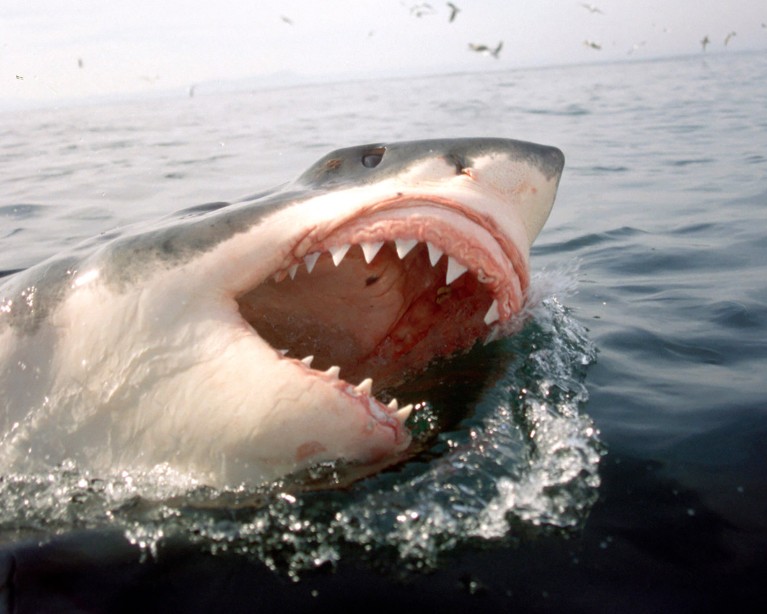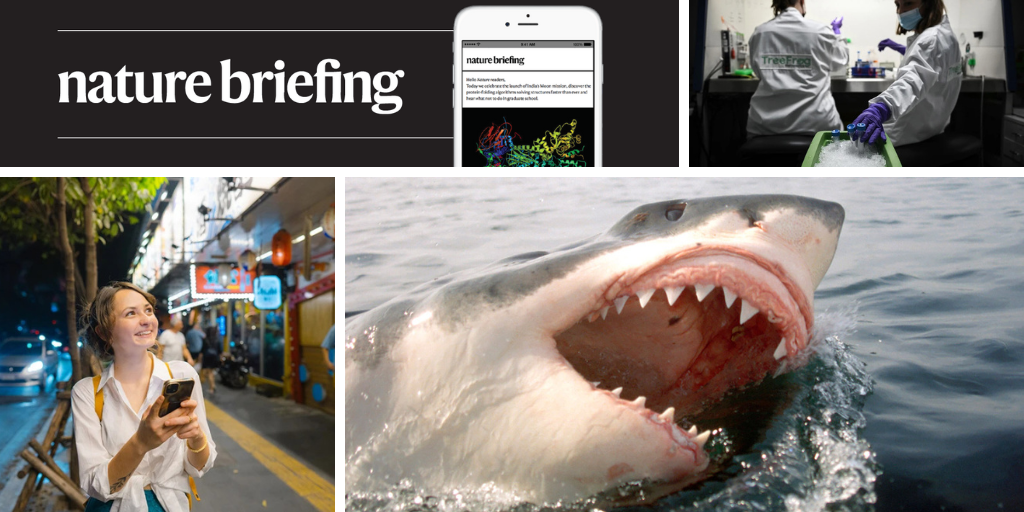You have full access to this article via your institution.
Hello Nature readers, would you like to get this Briefing in your inbox free every day? Sign up here.

Great white sharks (Carcharodon carcharias) are threatened by hunting and poaching.Credit: Education Images/Universal Images Group via Getty
Fifty years after it was released, Jaws is still shaping how we view — and protect — the ocean’s top predators. Marine conservation biologist David Shiffman describes the ‘Jaws effect’, which is now used in public-policy literature to explain how fictional portrayals of real-world issues impact what voters want leaders to do about those issues. “There’s still widespread fear, and in some cases it’s quite pseudoscientific in nature,” he says. “Around the same time, Star Wars came out, and no one was afraid that the Death Star was going to blow up Earth.”
Scientists say they have used artificial intelligence (AI) to slash the time it takes to produce a ‘gold-standard’ systematic review from months to just hours. The team says that they produced 12 such reviews, which bring together the results of multiple publications, in two days by automating two usually laborious steps in the process with large language models. But other researchers are sceptical of the team’s results from the information that’s been released. “For a scientific paper, its claims need to be verifiable — and I can’t verify it,” says James Thomas, a systematic-review specialist.
Preprint: medRxiv preprint (not peer reviewed)
There’s plenty of evidence that restricting calories — whether by eating smaller portions or intermittent fasting — seems to prolong life, but few of us are willing to adopt the strategy. Now a survey of the literature has found that an immunosuppressant derived from bacteria found in the soil on Rapa Nui (Easter Island) could slow ageing almost as well. But don’t start adding a side of rapamycin to your dinner yet: most of the evidence originates from mice and rats, and suppressing your immune system can have unwanted side effects.
New Scientist | 3 min read or read about the study in the researchers’ own words in The Conversation (4 min read)
Conference organizers who might be finding the United States less welcoming or desirable are grappling with a question that scientists from low- and middle-income countries have been asking them to consider for some time — which countries offer the ideal combination of accessibility and freedom? Thailand could be a top option, thanks to generous visa allowances and protections for human rights. Budapest offers an affordable European option, although the political climate is poor for people from some minority groups.
Features & opinion
When it comes to human health, anything larger than a bacterium in a stool sample has typically been cast as a villain, and that includes protists — single-celled organisms that are among the largest and most complex microorganisms found in the digestive tract. In some cases, this instinct is sound: the notorious parasites Giardia and Cryptosporidium are protists that you are better off without. But others might actually be beneficial, helping to control gut bacteria and supporting a healthy immune system. Some researchers are beginning to consider whether they might one day be introduced deliberately to restore gut health or fight inflammatory conditions, such as irritable bowel disease.
This editorially independent article is part of Nature Outlook: The human microbiome, a supplement produced with financial support from Yakult.
A man learns that his hiking partner of 15 years has had an ulterior motive in the latest short story for Nature’s Futures series.
Andrew Robinson’s pick of the top five science books to read this week includes the life and times of Albert Einstein and a round-up of what science fact can learn from science fiction.
Experiments in a ‘moth flight simulator’ reveal that bogong moths (Agrotis infusa) are one of the very few creatures known to be able to navigate by starlight for long-distance journeys. Plus, the gravitational pull of other galaxies might prevent the Milky Way from ultimately colliding with Andromeda.
Nature Podcast | 30 min listen
Subscribe to the Nature Podcast on Apple Podcasts, Spotify or YouTube Music, or use the RSS feed.
Today, Leif Penguinson is cooling off in the mountain streams of the Kaponigtal valley, in Hohe Tauern National Park in Austria. Can you find the penguin?
The answer will be in Monday’s e-mail, all thanks to Briefing photo editor and penguin wrangler Tom Houghton.
This newsletter is always evolving — tell us what you think! Please send your feedback to [email protected].
Thanks for reading,
Flora Graham, senior editor, Nature Briefing
With contributions by Jacob Smith
• Nature Briefing: Careers — insights, advice and award-winning journalism to help you optimize your working life
• Nature Briefing: Microbiology — the most abundant living entities on our planet — microorganisms — and the role they play in health, the environment and food systems
• Nature Briefing: Anthropocene — climate change, biodiversity, sustainability and geoengineering
• Nature Briefing: AI & Robotics — 100% written by humans, of course
• Nature Briefing: Cancer — a weekly newsletter written with cancer researchers in mind
• Nature Briefing: Translational Research — covers biotechnology, drug discovery and pharma


